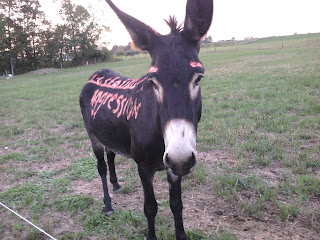What Do You Say to Yourself?
We all have a running commentary in our minds of things we tell ourselves. Things we heard as a child seem to rerun in our heads for the rest of our lives unless we are able to tap into those thoughts and examine them. Are they words that build you up or tear you down? How does this self talk effect your thoughts, emotions, habits, behavior and actions toward others?
One way in which our therapy donkey was able to help in an equine-assisted therapy session recently was to be a walking billboard of sorts to these destructive thoughts which then bring on destructive emotions.
The donkey is so wonderful as a therapy animal because they often have a naturally, low keyed personality and can be so expressive with those lovely long ears and big eyes. They also form strong bonds with people and want to live in harmony in a herd. Having them as part of the interaction in the sessions brings a richness, depth and, quite honestly, humor to our sessions.
As the equine specialist I help with the activities and interaction in the sessions as well as watch the horses' (and donkey's) behavior and comment on that when it is appropriate. I also got the non-toxic and washable paint to be used in a group session exploring negative self talk. The clients words were written in large letters on the donkey as examples of negative self talk and the resulting emotions. Frustrated, alone, helpless, aggression, bitterness, depression are emotions that often result from what can be for some a relentless barrage of hate, disrespect and disregard we heap on ourselves.
Thankfully that can be turned around. The first step is often just being aware that this type of talk is there in our heads. It is not the truth of who and what we are.
The donkey played an important role in helping to get those thoughts out in the open so they could be examined and discussed as to their validity. The donkeys expressions and body language in relation to the group dynamics is also very valuable. And one of the things I love, as a horse person, is that all that we ask of the equines in our sessions is to just be themselves!
I washed and groomed the donkey afterwards for which she thoroughly enjoyed! We got some nice bonding time together and her coat once again gleamed with a healthy shine (until her next dust bath). Just beyond the pasture in the picture below is a large, round, bare spot this donkey has made as her designated dusting spot!
It is an honor and a privilege to be able to be a part of equine-assisted therapy sessions and to see the growth and change in people. It is truly inspiring to see people overcome obstacles and struggles when they have the right support and willingness to learn. It is also fascinating as to the depth and sensitivity the horses (and donkey) brings to our interactions. I marvel at how very tolerant horses are in our treatment of them. I think back to some of the horse shows I went to when my daughter was young and showing horses. It was not uncommon to run into the mind set of a very domineering, controlling type of behavior toward the horse as a way to 'train' them for whatever event they were participating in. Of course not all people who show horses are this insensitive but as I spend more time with horses in this therapeutic I am appreciating how much they can teach us!
There is a wealth of information coming out as to the effectiveness of equine assisted therapy and experiential learning as this field opens up to bigger audiences. It is not just for horse person. I am using this blog as a way to share some of what I am learning and also to share the many different ways this type of work looks and feels. Please consider following along as I continue down in this fascinating journey!



Comments
Post a Comment
I value your thoughts on this subject.